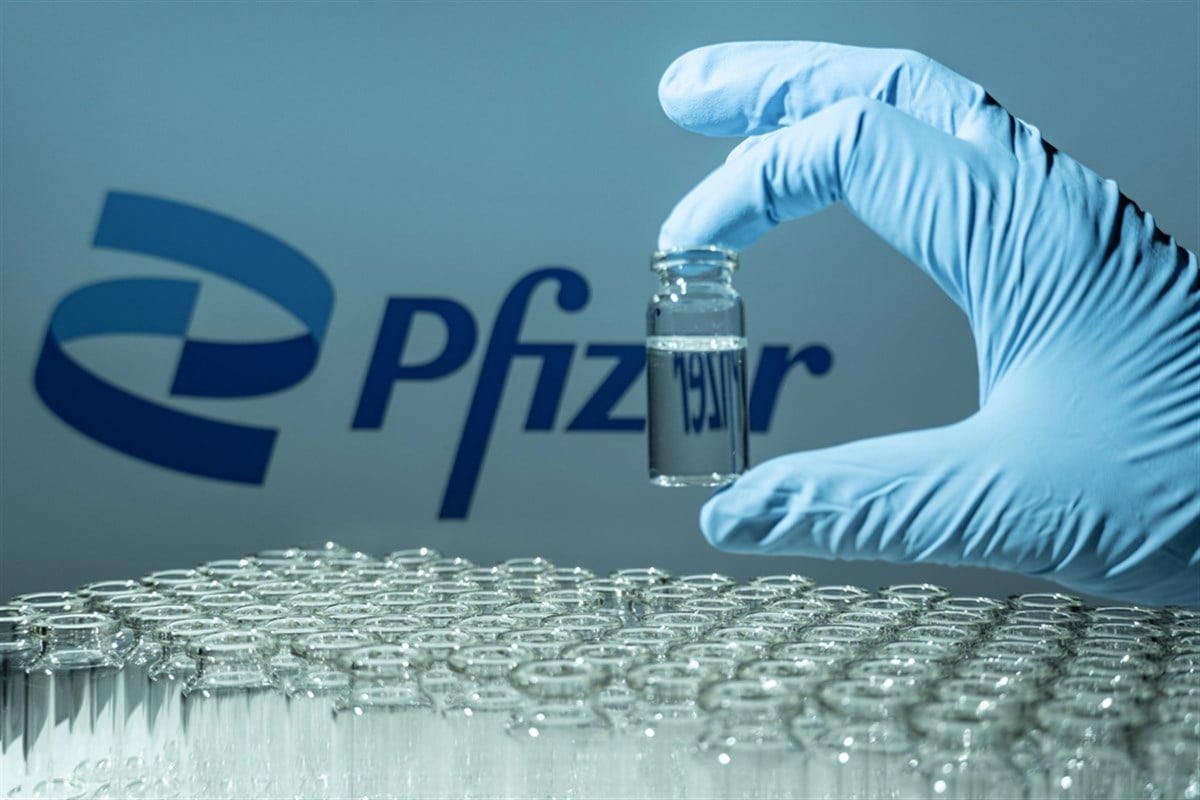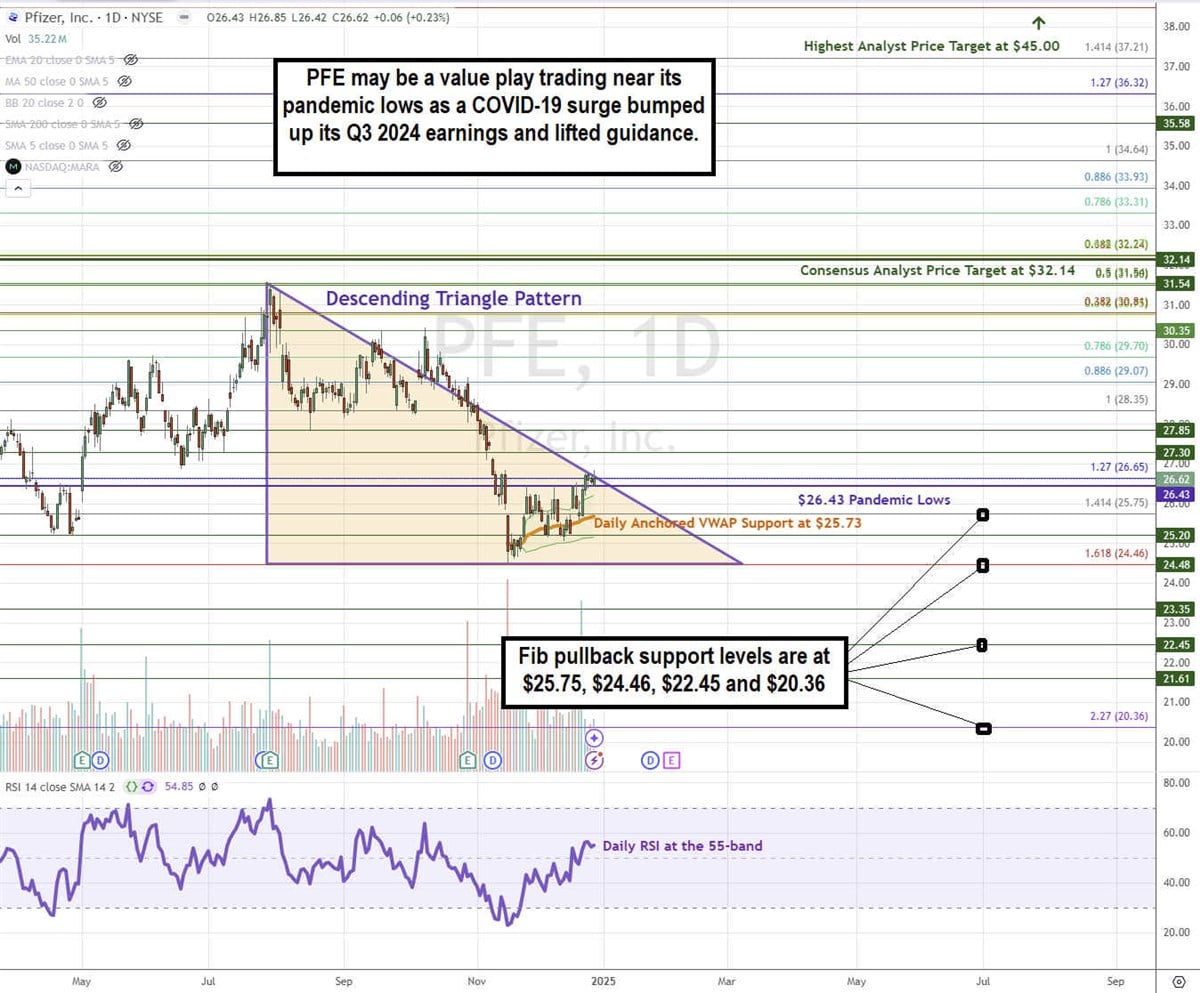
Pharmaceutical giant Pfizer Inc. (NYSE: PFE) stock is trading back down near its pandemic lows. Every time it attempts to climb over the $30 mark, something causes shares to slide right back down. Despite the disheartening price action, this medical sector giant is still one of the world’s largest research-based biopharmaceutical companies behind Eli Lilly & Co. (NYSE: LLY).
Pfizer is trading at a bargain valuation at just 9.1x forward earnings with a tasty 6.46% annual dividend yield. Here are four more reasons to consider this stock for your portfolio.
1) Pfizer Has Resumed Growth Again
Revenues had declined for five of the past six quarters heading into its Q3 report. In its third-quarter 2024 earnings report, Pfizer posted profits of $1.06 per share, which handily beat consensus estimates by 45 cents. Its revenues surged 32% YoY to $17.7 billion, absolutely crushing consensus estimates for $14.92 billion. The revenue growth reflects an operation increase of 32% YoY or $4.3 billion, mostly due to the growth contributions of its Paxlovid COVID-19 antiviral treatment and acquired products. Higher instances of COVID-19 infections in the summer have driven the surge in COVID-19 vaccines and treatments.
Excluding contributions from its COVID-19 treatments, Paxlovid and Comirnaty COVID-19 vaccine, revenues would have increased $1.7 billion or 14% YoY. Cost savings are on track to deliver at least $5.5 billion from its previously announced cost reduction initiatives.
Pfizer remains on track with its dose optimization studies for its oral GLP-1 receptor agonist candidate, Danuglipron. It's all once daily oral GLP-1 receptor agonist in Phase 1, and its oral small molecule GIPR antagonist is advancing in Phase 2 studies.
2) Pfizer Is Focused on Its Oncology Business
Pfizer is focused on growing its oncology business which is driven by its acquisition of massive $43 billion acquisition of Seagen. Critics and activist Starboard were very displeased with Pfizer overpaying for Seagen, which is only supposed to contribute around $3.1 billion in revenue to the topline in 2024.
Pfizer is already the world's third-largest oncology company based on 1H 2024. Its advanced prostate cancer drug XTANDI revenues rose 28% YoY. TALZENNA revenue rose 77% YoY. The company reported significant overall survival benefits for its Phase 3 TALAPRO study, which is a combination of TALZENNA and XTANDI. Its adult alpositive metastatic noncell lung cancer drug LOBRENA saw 31% operation growth. ELREXFIO for multiple myeloma treatment saw 80% sequential revenue growth over Q2 2024.
Pfizer has a solid pipeline for lung cancer treatments, which is the number one cause of cancer-related death around the world. It's enrolling patients in its Phase 3 clinical study for MEBROMESTOSTAN, its novel EZH2 inhibitor for men with metastatic castration-resistant prostate cancer. Pfizer is making progress on the development of two candidates to replace the current backbones of HER positive HER2 negative breast cancer.
3) Pfizer Raised the Full-Year 2025 Guidance and Updated the 2025 Forecast
The company raised its full-year 2024 EPS to $2.75 to $2.95, up from previous guidance of $2.45 to $2.65 versus $2.66 consensus estimates. Full-year 2024 revenue is expected to be between $61 billion to $64 billion, raised from previous guidance of $59.5 billion to $62.5 billion versus $61.13 billion. The updated guidance includes nearly $10.5 billion in anticipated revenues for Comirnaty ($5 billion) and Paxlovid ($5.5 billion).
On Dec. 17, 2024, Pfizer updated guidance for 2025. The impact of Medicare Part D redesign is expected to be a $1 billion headwind across its product portfolio in 2025. The new Trump administration is committed to reforming the pharmacy benefits management (PBM) industry but doesn't expect material vaccine policy changes. Prevnar revenues are expected to decline slightly in 2025. The company also reached its goal of achieving $4 billion in cost savings in 2024, with another $500 million expected in 2025.
4) PFE Stock May Attempt to Break Out of a Descending Triangle Pattern
A descending triangle is normally a bearish chart pattern indicator of lower highs on the bounce against flat bottom support. The descending upper trendline converges with the flat-bottom horizontal lower trendline support at the apex point. A breakdown triggers if the stock falls below the lower trendline support. A breakout triggers if the stock surges above the upper trendline resistance.

PFE formed its descending upper trendline resistance at the $31.54 swing high, converging with the flat-bottom lower trendline at $24.46 at the apex point. PFE initially appeared to have broken out through the upper trendline on Oct. 9, 2024, but shares fell back under by Oct. 30 and reached the lower trendline on Nov. 15, 2024, before staging a rally back toward the 2020 pandemic low of $26.43. The daily anchored VWAP is rising at $25.73. Fibonacci (Fib) pullback support levels are at $25.75, $24.46, $22.45, and $20.36.
Actionable Options Strategies: Bullish investors can consider using cash-secured puts at the Fib pullback support levels to buy the dip. If assigned the shares, then writing covered call at upside Fib levels executes a wheel strategy for additional income while collecting the hefty 6.46% annual dividend yield. The consensus analyst price target has 20.75% upside to $32.14.
The article "Pfizer: 4 Reasons to Buy This Stock " first appeared on MarketBeat.







